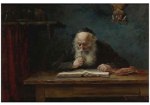[7] Davar Halamad Meniano
[Davar halamed meniano vadavar halamed misofo, #12 Ishmael]
The easiest term I’ve seen for this rule is deduction from context. In less-than-simple terms from R’Ishmael but a bit more accurate, the rule allows a passage to be deduced from its context [meniano] or from a later reference in a following passage [misofo].
An example of a meiniano exists in Exodus 20:13, where it states, “You shall not steal.” The phrase cannot mean simple pilfering because the other two offenses listed in the verse both carry with them the death penalty. Therefore, the phrase must mean stealing human beings, i.e., kidnapping, which, then, carries with it the death penalty like murder and adultery [cf. Mekhilta de R’Ishmael Bachodesh 8:51-65].
The word tinshemet is listed in the category of unclean birds that one cannot eat [Levitic
us 11:18]. However, tinshemet is in the list of creeping animals in Leviticus 11:30. Therefore, it’s clear that tinshemet [1] is the name or category of a certain bird as well as of a certain creeping thing.
An example of a misofo can be found in Leviticus 14:34, where Hashem says, “I will place a Tzaraat affliction upon a house in the land of your possession, etc.” The houses that can be
afflicted are limited to houses constructed of stones, timber, and mortar [cf. Leviticus 14:45]. The Torah mentions that no one can have relations with any close relative [Leviticus 18:6]. However, one does not know the extent of who is “too close” for marital consideration. Therefore, Leviticus 18:7-18 lists those with whom one is forbidden to marry [these unions, subsequently are punished with the death penalty prior to the arrival of offspring].
In another example, Deuteronomy 19:6 is in reference to the cities of refuge. It states, “lest the avenger of blood pursue the manslayer, while his heart is hot, and overtake him, because the way is long, and kill him; whereas he is not worthy of death, because he did not hate him in time past.” The ending phrase, “he did not hate him in time past” is in reference to the blood avenger and not the slayer.
[1] Hebrew, tinshemet means owl


Thanks for ones marvelous posting! I genuinely enjoyed reading it, you happen to be a
great author. I will be sure to bookmark your blog and definitely will come back someday.
I want to encourage you to definitely continue your
great writing, have a nice weekend!
LikeLike
Usually I do not read post on blogs, however I wish to say that this write-up very compelled me to
check out and do so! Your writing style has been surprised me.
Thanks, very great article.
LikeLike
I like the valuable information you supply to your articles.
I’ll bookmark your weblog and check once more
here regularly. I’m fairly sure I will be informed many new stuff proper right
here! Best of luck for the following!
LikeLike
Tremendous issues here. I am very happy to look your article.
Thanks a lot and I am looking forward to touch you.
Will you kindly drop me a e-mail?
LikeLike
Hi there! Do you use Twitter? I’d like to follow you if that would be okay.
I’m absolutely enjoying your blog and look
forward to new posts.
LikeLike
The least re[a]d [web]blog on the [inter]net ::: understandably so! While very interesting to ‘read’ … how much more enlightening it would be if I was reading this in a ‘group’ setting….where there could be discussion, dispute, arguments, etc…. Still…I love it! So write on!
LikeLike
I agree, Pat. Conversations over Torah is far more rewarding than reading a commentary.
LikeLike